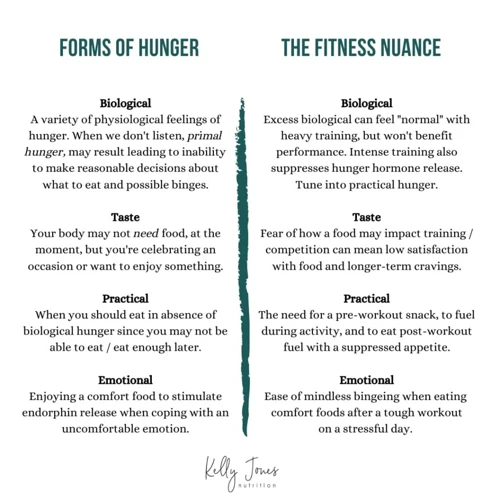The relationship between exercise, hunger, and cravings is complex and often misunderstood. While exercise has long been thought to increase appetite, new research suggests that this isn’t always the case. In fact, the impact of exercise on hunger and cravings may differ depending on a range of factors, including sex, age, and exercise intensity. Understanding these nuances is important for anyone looking to manage their appetite and maintain a healthy weight. In this article, we’ll explore the latest research on the subject, comparing how exercise affects hunger and cravings in men versus women. Additionally, we’ll provide some tips and strategies for managing appetite and promoting healthy weight loss.
Exercise and Appetite

Physical exercise is a promising tool for those who seek to manage their appetite and control cravings. But how does exercise affect our hunger levels? Is there a difference between the way men and women react to exercise-induced appetite control? In this section, we will explore the relationship between exercise and appetite in detail, delving into the impact of exercise on hormones related to appetite and comparing the appetite control benefits of exercise in men versus women.
How Exercise Affects Hormones Related to Appetite
Regular exercise has been shown to impact the hormones that regulate appetite in both men and women. Two such hormones, ghrelin and peptide YY (PYY), play important roles in hunger and satiety.
Ghrelin is a hormone produced in the stomach that stimulates appetite. Studies have shown that exercise can lead to a decrease in ghrelin levels in both men and women, which can help reduce feelings of hunger. This decrease in ghrelin has been linked to high-intensity exercise lasting for at least 60 minutes.
PYY is a hormone produced in the intestines that suppresses appetite. Exercise has been shown to increase PYY levels in both men and women. One study found that participants who performed 60 minutes of cardiovascular exercise had significantly higher PYY levels than those who did not exercise.
In addition to ghrelin and PYY, leptin is another hormone that plays a role in appetite regulation. Leptin is produced by fat cells and signals to the brain that the body has enough energy stores and can decrease appetite. However, long-term exercise may decrease leptin levels in women, potentially increasing their appetite.
While exercise can impact hormones related to appetite control, the specific effects may differ between men and women. It is important to consider individual factors such as age, weight, and fitness level when developing an exercise plan for appetite management.
Men vs. Women: Differences in Appetite Control After Exercise
Research has found that there are differences in how men and women experience appetite control after exercising. These differences can be attributed to various factors such as hormonal responses to exercise, body composition, and even societal norms.
Hormonal Responses
One study investigated the hormonal responses to exercise in men and women and found that men had a greater suppression of hunger hormone, ghrelin, after moderate-intensity exercise compared to women. This could suggest that men may experience less hunger after exercise, making weight loss more manageable for them.
Body Composition
It’s important to note that men and women have different body compositions, with men generally having more muscle mass and higher testosterone levels, while women have more body fat and estrogen. This can result in different metabolic rates and energy expenditure during exercise, which could also impact appetite control.
Societal Norms
Societal norms and cultural expectations may also influence how men and women approach appetite control. For example, women may feel more pressure to restrict their food intake and prioritize weight loss, leading to potential overeating or binge eating behaviors. On the other hand, men may feel less societal pressure to control their appetite and may indulge in high-calorie foods after exercise.
Below is a table summarizing the differences in appetite control between men and women after exercise:
| Factor | Men | Women |
| Hormonal Responses | Greater suppression of ghrelin (hunger hormone) after moderate-intensity exercise | Less suppression of ghrelin after exercise compared to men |
| Body Composition | Higher muscle mass and testosterone levels | Higher body fat and estrogen levels |
| Societal Norms | May feel less pressure to control appetite | May feel more pressure to restrict food intake |
Strategies for Appetite Management
When it comes to weight management, managing appetite is crucial. Cravings and hunger pangs can sabotage even the best-laid plans for a healthy diet. The good news is that there are effective strategies that can help control appetite, enabling you to stick with healthy eating habits. In this section, we will explore some proven strategies for appetite management, including exercise tips and dietary recommendations. Implementing these strategies can help you maintain healthy eating habits over the long-term, while avoiding the pitfalls of cravings and hunger.
Exercise Tips for Curbing Hunger and Cravings
When it comes to curbing hunger and cravings through exercise, there are some tips that could be helpful for both men and women. Here are some recommendations:
| Tip | Description |
|---|---|
| Work out in the morning | Starting your day with exercise is a great way to jumpstart your metabolism and reduce hunger throughout the day. |
| Engage in high-intensity interval training (HIIT) | HIIT has been shown to reduce levels of ghrelin, the hunger hormone, and increase levels of peptide YY, a hormone that signals feelings of fullness. |
| Include resistance training | Resistance training builds muscle mass, which can boost metabolism and reduce cravings. |
| Stay hydrated | Drinking water before and during exercise can help reduce hunger and increase feelings of fullness. |
| Avoid over-exercising | Over-exercising can lead to increased hunger and cravings, as well as potential injury or burnout. |
| Find an exercise routine you enjoy | When you enjoy your exercise routine, you are more likely to stick with it, which can lead to long-term appetite management. |
While exercise can be an effective tool for curbing hunger and cravings, it is important to note that it is not a one-size-fits-all solution. It may take some trial and error to find the routine that works best for each individual. Additionally, exercise should always be paired with a balanced diet and adequate rest to maximize its efficiency.
Dietary Recommendations for Appetite Control
When it comes to controlling appetite through diet, there are several nutritional strategies that can be put into practice. Here are a few dietary recommendations to consider:
- Eat more protein to stay full longer.
- Incorporate foods that are high in fiber into your diet, such as fruits, vegetables, and whole grains.
- Minimize intake of processed foods, which can lead to fluctuations in blood sugar levels and trigger cravings.
- Drink plenty of water throughout the day to stay hydrated and help curb hunger.
- Avoid skipping meals, as this can cause hunger to spike later in the day.
- Practice mindful eating, which involves paying attention to hunger and fullness signals, as well as savoring each bite.
- Consider incorporating appetite-suppressing foods into your diet, such as ginger, green tea, or foods high in omega-3 fatty acids.
- Limit intake of sugary and high-fat foods, which can trigger cravings and lead to overeating.
Adopting these dietary recommendations in combination with regular exercise can be a powerful combination for appetite control. However, it is important to note that every individual’s body is unique and may respond differently to specific dietary changes. Consulting a healthcare professional or registered dietitian can be helpful in developing a personalized plan for managing appetite and cravings.
Conclusion
In conclusion, the impact of exercise on hunger and cravings in men vs. women depends on various factors such as hormones, metabolism, and eating habits. Nevertheless, regular physical activity appears to have a positive effect on appetite control and weight management in both sexes.
Exercise and Hormones
Research has shown that exercise can affect hormones related to appetite such as ghrelin and leptin. These hormones regulate hunger and metabolism, and exercising can decrease ghrelin levels and increase leptin levels, leading to a feeling of fullness and reduced appetite.
Gender Differences
While both men and women can benefit from exercise, the impact on appetite control may vary. Studies have found that women tend to have a stronger appetite response after exercise than men, possibly due to hormonal differences. However, this does not mean that women should avoid exercise. In fact, regular physical activity is crucial for maintaining a healthy weight and overall well-being.
Strategies for Appetite Management
To manage hunger and cravings, individuals can incorporate both exercise and dietary strategies. Engaging in aerobic and resistance exercises can help reduce appetite and increase metabolism, while consuming high-fiber foods and protein-rich meals can promote satiety and prevent overeating.
Concluding Thoughts
Overall, the impact of exercise on appetite control in men vs. women can be complex, and further research is needed to fully understand the mechanisms involved. Nevertheless, incorporating regular physical activity and a balanced diet can help manage hunger and promote a healthy lifestyle for all individuals, regardless of gender.
Frequently Asked Questions
What are the hormones that affect appetite?
Two hormones in particular, ghrelin and leptin, are known to play a role in appetite regulation.
How does exercise affect appetite and hunger?
Exercise can both suppress and stimulate appetite, depending on various factors such as the intensity and duration of the exercise, type of exercise, and individual differences.
Do men and women have different appetite responses to exercise?
Research suggests that women tend to have a stronger and longer-lasting reduction in appetite after exercise compared to men.
Can exercise reduce cravings for unhealthy foods?
Yes, research has shown that exercise can help reduce cravings for high-fat, high-sugar foods that often lead to overeating and weight gain.
How long does the appetite-suppressing effect of exercise last?
The duration of the appetite-suppressing effect of exercise can vary depending on the individual and the type of exercise, but it typically lasts up to an hour after the exercise session.
What types of exercise are best for suppressing appetite?
High-intensity interval training (HIIT) has been shown to be particularly effective at suppressing appetite, compared to steady-state exercise like jogging.
Can dietary changes alone help control appetite?
Dietary changes such as eating more protein and fiber-rich foods, staying hydrated, and avoiding highly processed foods can all help control appetite, but exercise is also an important factor.
How important is consistency in exercise for managing appetite?
Consistency in exercise is crucial for managing appetite, as the appetite-suppressing effects of exercise are most potent when exercise is done regularly.
Can a lack of sleep affect appetite control?
Yes, research has shown that a lack of sleep can disrupt hormones that regulate appetite, leading to an increase in hunger and cravings.
What are some other benefits of regular exercise besides appetite control?
Regular exercise has been shown to have numerous health benefits, including improved cardiovascular health, increased muscle mass and strength, and better mental health.







